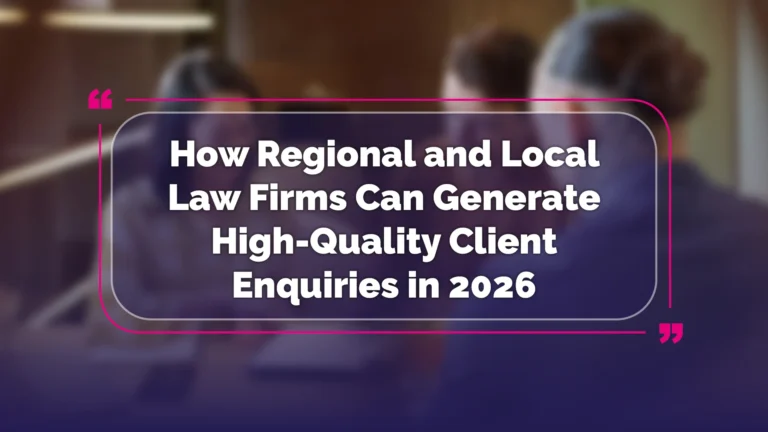Engage, Connect, and Grow with Emotion-Based Marketing
Introduction
In today’s competitive legal landscape, distinguishing your firm from the multitude requires more than just highlighting your services. The key to truly connecting with clients and building a loyal client base lies in the power of emotional law firm marketing. This approach focuses on creating an emotional response in your audience, fostering a deeper connection and loyalty to your brand. Unlike traditional law firm marketing, which emphasises the features and benefits of a service, emotional marketing taps into the feelings and values of your clients.
Business development is a crucial aspect of modern legal marketing strategies. This guide will explore the principles of emotional marketing, why it is effective, and how it can be applied to the legal industry. We will delve into the importance of understanding and defining your firm’s unique selling points (USPs), aligning them with client emotions, and implementing both conscious and subconscious law firm marketing strategies. Through practical examples and actionable insights, you will learn how to celebrate positive client reviews and engage with your community, ultimately building a trustworthy and caring image for your firm.
By the end of this guide, you’ll be equipped to harness the power of emotional marketing, transforming your approach from selling legal services to selling emotions, and fostering a lasting, meaningful relationship with your clients.
Key Takeaways
- Emotional Marketing Builds Connections: Focus on creating emotional responses to foster deeper client relationships.
- Human Connection Drives Decisions: Emotions influence decisions; leverage them to build meaningful bonds.
- Memorable Advertising: Emotionally charged ads enhance brand recall.
- Emotional Bonds Foster Loyalty: Strong emotional connections lead to client loyalty and advocacy.
- Differentiation Through Emotion: Stand out by highlighting emotional and unique values.
- Strategic Budgeting: Use cost-effective, high-impact marketing strategies.
- Clear USPs: Define and communicate your firm’s unique selling points.
- Align USPs with Emotions: Match your strengths with client emotions and needs.
- Comprehensive Marketing: Use both visible and subtle strategies to build trust.
- Celebrate Success: Promote positive reviews to build trust and credibility.
- Community Engagement: Active participation in local events builds a caring image.
- Emotional Focus: Prioritise emotional marketing to deepen client relationships.
The Power of Emotional law firm Marketing
Understanding Emotional Marketing
Digital marketing involves creating an emotional response in your audience, which can lead to a stronger connection and loyalty to your brand. Unlike traditional marketing, which focuses on the features and benefits of a product or service, emotional marketing aims to evoke specific feelings that align with the brand’s identity and values.
Why Emotional Marketing is Effective in Law Firm Marketing
Human Connection: People make decisions based on emotions and then justify them with logic. By tapping into emotions, brands can create a deeper, more meaningful connection with their audience.
Memorability: Emotions are powerful memory triggers. Ads that evoke emotions are more likely to be remembered, increasing brand recall and recognition.
Loyalty and Advocacy: Emotional bonds create loyal customers who are more likely to become brand advocates, spreading positive word-of-mouth and recommending the brand to others.
Differentiation: In a competitive market, emotional marketing can set a brand apart by highlighting unique values and emotional benefits rather than just functional attributes.
Types of Emotional Appeals
Happiness: Positive emotions like joy and satisfaction can create a feel-good association with a brand.
Trust: Building trust through transparency and reliability fosters a secure relationship with clients.
Fear/Security: Addressing fears and offering solutions can position a brand as a protector and problem-solver.
Belonging: Creating a sense of community and belonging can make clients feel part of something bigger.
Examples from Industry Leaders
Coca-Cola: Selling Happiness
Coca-Cola has long been a master of emotional marketing, with campaigns centred around happiness, friendship, and togetherness. The brand’s famous “Share a Coke” campaign personalised bottles with names, encouraging people to share moments of happiness with friends and family. This not only boosted sales but also strengthened the emotional connection consumers felt with the brand.
Lessons for Legal Professionals
Personalization: Just as Coca-Cola personalised their bottles, law firms can personalise their services. A personalised law firm’s website can significantly enhance client engagement by addressing clients by name and showing genuine interest in their personal stories, creating a sense of care and attention.
Positive Messaging: Highlighting positive outcomes and client success stories can evoke feelings of happiness and satisfaction, building a positive association with the firm.
Apple: Selling Prestige and Innovation
Apple’s marketing strategy focuses on prestige, innovation, and simplicity. The brand creates a sense of exclusivity and aspiration, making consumers feel they are part of an elite group when they purchase Apple products. Apple’s sleek design and cutting-edge technology are consistently highlighted in their emotionally charged advertisements.
Lessons for Legal Professionals
Exclusivity and Expertise: Position your firm as a leader in a specific legal area. Emphasise your unique expertise and successful track record to create a sense of prestige.
Innovation: Showcase how your firm uses innovative approaches to solve legal issues. This can appeal to clients who value forward-thinking and efficiency.
Nike: Selling Empowerment
Nike’s “Just Do It” campaign is synonymous with empowerment and overcoming obstacles. The brand’s advertisements often feature athletes who have triumphed over adversity, inspiring consumers to achieve their own goals.
Lessons for Legal Professionals
Empowerment: Share stories of how your firm has helped clients overcome significant challenges. Highlighting these successes can inspire potential clients to trust your firm with their own legal battles.
Motivational Messaging: Use motivational language in your marketing materials to instil confidence and determination in your clients.
Challenges for Law Firms
Budget Constraints
Law firm marketing budget constraints are a significant challenge for many law firms when it comes to planning and allocating funds for marketing activities. Unlike top companies such as Coca-Cola and Apple, which have vast resources to allocate towards extensive marketing campaigns, most law firms operate with limited budgets. This discrepancy necessitates a more strategic approach to marketing efforts.
Differences in Budget Allocation
Advertising Spend: Major corporations can afford high-cost advertising platforms such as prime-time TV spots, billboards, and global online campaigns. In contrast, law firms must often rely on more cost-effective methods such as social media marketing, local advertising, and search engine optimisation (SEO).
Marketing Teams: Large companies have dedicated marketing teams with specialised roles, whereas law firms might only have a small marketing department or even rely on external agencies or a single in-house marketer.
Resource Allocation: Corporations can invest in large-scale brand-building activities, while law firms need to focus their resources on targeted, high-impact strategies that deliver measurable results.
Overcoming Budget Constraints
Prioritise Channels: Focus on marketing channels that offer the highest return on investment. Social media, content marketing, and SEO can be highly effective and budget-friendly.
Leverage Technology: Utilise affordable marketing automation tools and analytics platforms to streamline efforts and track performance.
Build Partnerships: Collaborate with other local businesses or legal professionals to share marketing costs and reach a broader audience.
Content Marketing: Develop high-quality content that addresses client pain points and showcases your expertise. This can attract organic traffic and generate leads without significant financial investment.
Defining Your USP (Unique Selling Points)
Having a clear and compelling USP is crucial for any law firm looking to differentiate itself in a competitive market. A USP articulates what sets your firm apart from others and can guide all aspects of your marketing efforts, especially emotional law firm marketing.
Importance of a Clear USP
Differentiation: A strong USP highlights your firm’s unique qualities, making it easier for potential clients to choose you over competitors.
Consistency: Ensures that all marketing messages are aligned and consistent across different channels, building a cohesive brand image.
Focus: Helps the firm concentrate its marketing efforts on specific strengths, maximizing impact and efficiency.
Evaluating and Defining Your Firm’s USP
Identify Strengths: Look at what your firm does exceptionally well. This could be a particular area of expertise, exceptional customer service, or a unique approach to legal problems. Developing your law firm’s brand through these strengths can help create a unique brand identity.
Understand Your Audience: Know your core clientele and what they value most. Tailor your USP to address these values and needs.
Analyse Competitors: Examine what other firms in your area are offering and find gaps that your firm can fill. Ensure your USP clearly differentiates you from the competition.
Communicate Clearly: Your USP should be straightforward and easy to understand. It should immediately convey the benefits of choosing your firm.
Guiding Emotional Marketing Efforts for Your Law Firm’s Brand
Craft Emotional Appeals: Use your USP to create marketing messages that evoke specific emotions. For example, if your USP is about being the most compassionate law firm, focus on stories and testimonials that highlight this aspect.
Align with Client Emotions: Ensure your USP resonates with the emotions and values of your target audience. If your clients value trust and reliability, emphasize these traits in your marketing.
Reinforce Through Action: Back up your USP with tangible actions and evidence. If you claim to be the most innovative firm, showcase your latest technological advancements or innovative case strategies.
Aligning USPs with Client Emotions
To effectively leverage emotional law firm marketing, it is essential to align your firm’s unique selling points (USPs) with the emotional needs and values of your clients. This alignment ensures that your marketing efforts resonate deeply with your audience, creating a strong emotional connection.
Understanding Your Core Clientele
Demographic Analysis: Start by analysing the demographics of your core clientele and prospective clients. Understand their age, gender, occupation, and other relevant characteristics. This information can help you tailor your messaging to appeal to specific groups.
Psychographic Insights: Go beyond demographics to understand the psychographics of your clients. What are their values, beliefs, and lifestyles? What motivates them, and what concerns do they have? These insights are crucial for crafting emotional appeals.
Client Feedback: Collect and analyse client feedback to gain insights into their experiences and emotions. This feedback can reveal what clients appreciate most about your firm and what emotional triggers resonate with them.
Crafting Emotional Appeals
Identify Emotional Triggers: Determine the key emotions that drive your clients’ decisions. Common emotional triggers in legal services include trust, relief, empowerment, and security.
Create Resonant Messages: Craft law firm marketing messages that highlight how your firm’s USPs address these emotional triggers. For example, if your USP is exceptional client care, emphasise how this care leads to feelings of trust and security.
Use Storytelling: Leverage the power of storytelling to create emotional connections. Share real-life stories of how your firm has helped clients overcome challenges and achieve positive outcomes. These stories can evoke emotions and make your firm more relatable.
Practical Examples
Trust and Reliability: If your USP is about trust and reliability, focus on emotional appeals that highlight your firm’s track record of successful outcomes and satisfied clients. Use testimonials and case studies to showcase how your firm has consistently delivered results and provided peace of mind to clients.
Compassion and Support: If your USP is centred around compassion and support, emphasize the emotional impact of your firm’s empathetic approach. Highlight stories of clients who felt understood and supported during difficult times, and how this compassion made a difference in their lives.
Innovation and Efficiency: If your USP is about innovation and efficiency, create emotional appeals that showcase how your firm’s cutting-edge solutions have simplified legal processes and relieved clients of stress. Highlight the peace of mind that comes from knowing their legal matters are handled with the utmost efficiency.
Conscious Law Firm Marketing Strategies
Conscious marketing strategies involve deliberate, visible actions that showcase your firm’s strengths and values. These strategies help build trust and credibility, reinforcing your firm’s image in the eyes of potential clients.
Robust Review Management
Managing online reviews for Google My Business, Solicitor.info, TrustPilot, etc., is a critical aspect of conscious law firm marketing. Encouraging positive reviews and showcasing testimonials from legal clients can significantly enhance your firm’s reputation and attract new clients, while negative reviews, if handled well, can demonstrate your commitment to client satisfaction.
Encouraging Positive Reviews
Ask for Feedback: Encourage satisfied clients to leave positive reviews on platforms like Google, Yelp, and legal directories. Make it easy for them by providing direct links to review pages.
Showcase Testimonials: Feature positive client testimonials on your website and social media channels. Highlight specific examples of how your firm has helped clients achieve their desired outcomes.
Respond to Reviews: Engage with clients by responding to their reviews. Thank those who leave positive feedback and address any concerns raised in negative reviews. This shows that you value client feedback and are committed to continuous improvement.
Celebrating Positive Client Reviews
Highlight Success Stories: Share detailed success stories that illustrate how your firm has made a positive impact on clients’ lives. Use these stories in blog posts, social media updates, and marketing materials.
Visual Content: Use visual content, such as infographics and videos, to showcase positive client reviews and success stories. Visuals can be more engaging and shareable than text alone.
Client Spotlights: Feature clients in “spotlight” posts that tell their stories and how your firm helped them. This not only highlights your firm’s success but also builds a sense of community and appreciation.
Subconscious Law Firm Marketing Strategies
Subconscious law firm marketing strategies involve subtle, behind-the-scenes actions that build trust and a caring image without overtly promoting your firm. These strategies can create a lasting impression on clients and potential clients.
Engaging with the Community
Active community engagement is a powerful way to build a positive reputation and demonstrate your firm’s commitment to making a difference. A full service marketing agency can help with community engagement by leveraging various marketing services such as online marketing, PR, events, and social media. This engagement can take many forms, from participating in local events to supporting charitable causes.
Participating in Local Events
Community Involvement: Participate in local events, such as fairs, festivals, and charity runs. This visibility can help build a positive image and foster a sense of trust and familiarity with potential clients.
Educational Workshops: Host or sponsor educational workshops on legal topics relevant to the community. This positions your firm as a knowledgeable and helpful resource, building credibility and trust.
Demonstrating Care and Commitment
Client Follow-Ups: Implement a follow-up system to check in with clients after their case is resolved. This shows that you care about their well-being beyond the legal matter and can foster long-term relationships.
Thought Leadership: Share your expertise through thought leadership articles, blog posts, and social media updates. Providing valuable insights and information can position your firm as a trusted authority in the legal field.
Long-term Benefits of Emotional Law Firm Marketing
Embracing emotional marketing offers several long-term benefits for your law firm, helping to build a sustainable and successful practice.
Benefits Include:
Stronger Client Relationships: A well-executed law firm marketing strategy, particularly one that leverages emotional marketing, can create a lasting impact by fostering deeper connections with clients, leading to stronger, more trusting relationships.
Increased Loyalty: Clients who feel emotionally connected to your firm are more likely to remain loyal and return for future services.
Greater Advocacy: Satisfied clients are more likely to advocate for your firm, providing valuable word-of-mouth referrals.
Enhanced Reputation: A firm that consistently demonstrates care, empathy, and community involvement can build a positive reputation, attracting more clients.
Competitive Advantage: Emotional marketing can differentiate your firm from competitors, making it more attractive to potential clients who value a personal touch.
Conclusion
Emotional law firm marketing is a powerful tool that can help law firms build stronger connections with clients, differentiate themselves in a competitive market, and foster long-term loyalty and advocacy. By understanding and leveraging emotional triggers, aligning your USPs with client emotions, and implementing both conscious and subconscious law firm marketing strategies, your firm can create a lasting, positive impact.
Final Thoughts
Incorporating emotional marketing into your overall strategy requires a shift from merely selling services to selling emotions. By focusing on the human aspect of your practice, you can build deeper, more meaningful relationships with your clients. Remember, clients may forget what you said, but they will never forget how you made them feel. Embrace the power of emotional law firm marketing, and watch your firm thrive.
Action Plan
To implement the strategies discussed in this guide, follow this action plan:
- Define Your Emotional Marketing Goals: Establish clear objectives for your emotional marketing efforts, such as increasing client engagement, improving retention rates, or enhancing your firm’s reputation.
- Identify Core Emotions and Values: Determine the key emotions and values that align with your firm’s identity and resonate with your target audience.
- Craft Emotional Appeals: Develop marketing messages and campaigns that evoke these emotions. Use storytelling, testimonials, and visual elements to create a compelling narrative.
- Search Engine Optimisation (SEO): Incorporate search engine optimisation (SEO) strategies to increase your law firm’s online visibility and drive more visitors to your website. Focus on producing quality content that attracts potential clients through search engine results pages and grows your website’s authority.
- Implement Conscious and Subconscious Strategies: Utilise both visible marketing actions and subtle cues to build a trustworthy and caring image. Focus on review management, community engagement, and brand aesthetics.
- Celebrate Positive Reviews: Highlight and share positive client reviews across all marketing channels to build trust and showcase your firm’s success.
- Engage with the Community: Actively participate in community events, support local causes, and build partnerships to strengthen your local reputation.
- Measure and Refine: Continuously monitor the impact of your emotional marketing efforts, analyse performance data, and refine your strategies based on insights gained.
Further Reading and Resources
For more insights and practical tips on emotional marketing and other aspects of law firm marketing, consider exploring the following resources or speak to our team about how we can transform your digital marketing for law firms:
- Books:
- “Made to Stick: Why Some Ideas Survive and Others Die” by Chip Heath and Dan Heath
- “Contagious: How to Build Word of Mouth in the Digital Age” by Jonah Berger
- “Building a StoryBrand: Clarify Your Message So Customers Will Listen” by Donald Miller
- Websites and Blogs:
- Moz – www.moz.com (for SEO and online marketing tips)




